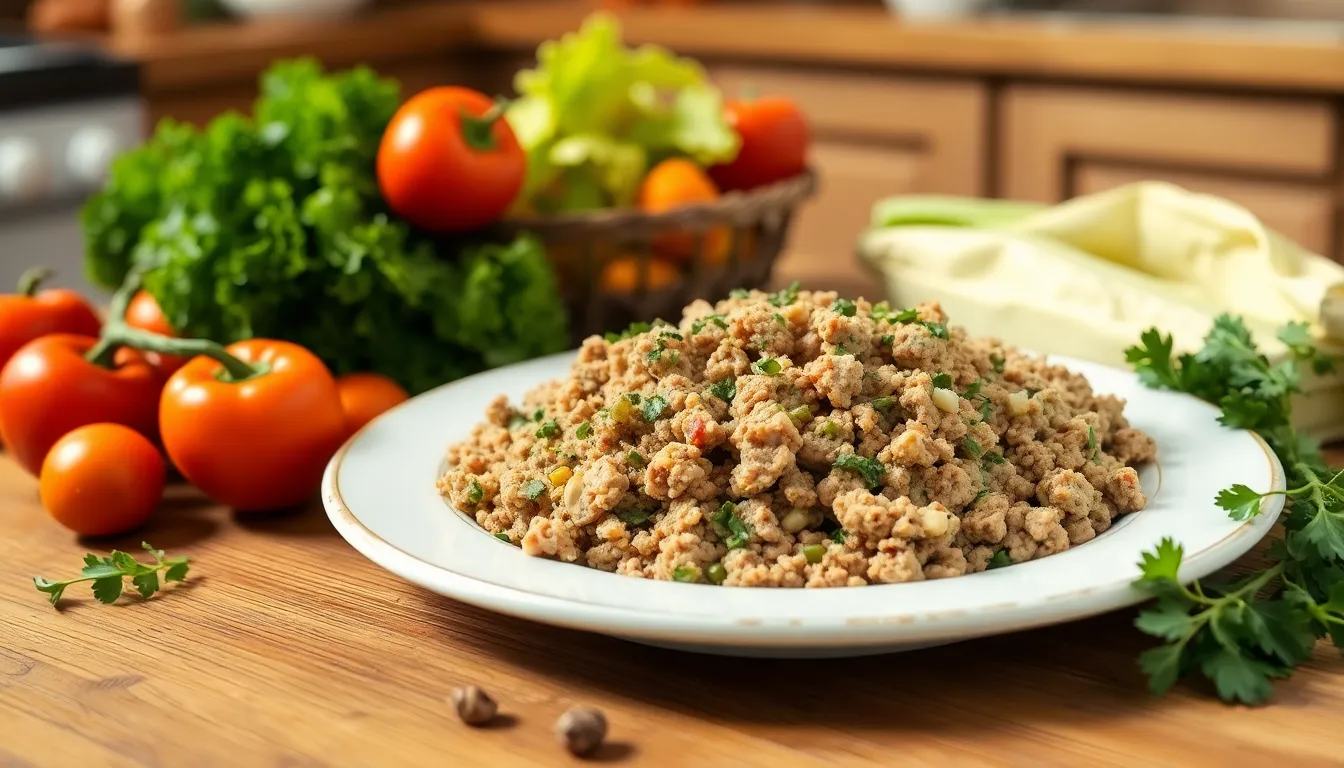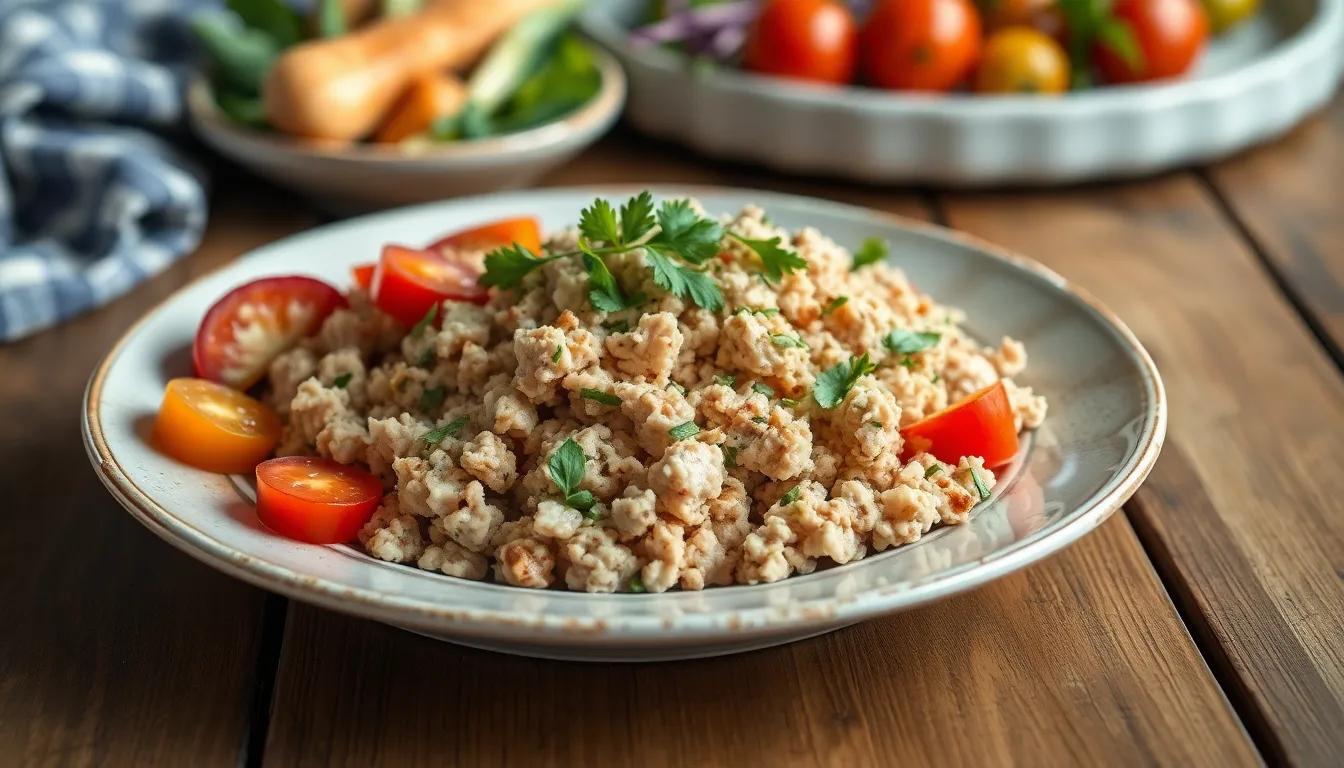Ground turkey often struts into the kitchen like a health-conscious superhero, ready to save the day with its lean protein and low-fat charm. But before diving into that delicious turkey burger or savory meatloaf, one question lingers: how many calories are lurking in that ground goodness?
Understanding the calorie content of ground turkey isn’t just for the fitness fanatics; it’s for anyone who wants to make smarter meal choices. With its versatile nature and ability to absorb flavors like a sponge, ground turkey can easily become a staple in any diet. So let’s unravel the mystery of those calories and see how this poultry powerhouse can fit into a balanced lifestyle while keeping taste buds happy. Who knew counting calories could be this exciting?
Understanding Ground Turkey
Ground turkey serves as a healthy alternative to traditional meats. This protein-rich option offers versatility in various dishes, appealing to those seeking nutritious choices.
Types of Ground Turkey
Three main types of ground turkey exist: regular, lean, and extra-lean. Regular ground turkey typically contains about 20% fat, making it suitable for flavorful recipes. Lean ground turkey features around 10% fat, offering a healthier option while maintaining taste. Extra-lean ground turkey contains 7% fat or less, ideal for low-fat diets.
Nutritional Profile
A standard 3-ounce serving of ground turkey provides approximately 160 calories. Protein content averages 22 grams, supporting muscle development and repair. Additionally, ground turkey contains essential nutrients, including B vitamins and zinc, which promote overall health. Compared to beef, turkey generally offers fewer calories and less saturated fat, making it a smart choice for balanced diets.
Calories in Ground Turkey

Ground turkey serves as a low-calorie protein option with various health benefits. The calorie content varies based on the type of ground turkey selected.
Comparison with Other Meats
Ground turkey contains fewer calories than both ground beef and pork. A 3-ounce serving of ground turkey provides about 160 calories, whereas the same serving of ground beef has roughly 250 calories. When comparing extra-lean ground turkey to regular chicken, ground turkey maintains a competitive edge with lower saturated fat, making it a favorable choice for health-conscious individuals. This calorie difference highlights ground turkey’s role as a versatile substitute in recipes.
Factors Influencing Caloric Content
Caloric content in ground turkey varies due to fat content and preparation methods. Regular ground turkey typically contains around 20 percent fat, leading to a higher calorie count compared to lean options with 7 percent fat. Cooking techniques such as frying can increase the overall calorie content due to added oils or fats. Seasonings and additional ingredients in recipes further affect the total calorie count. Understanding these variables aids in making informed dietary choices while incorporating ground turkey into meals.
Health Benefits of Ground Turkey
Ground turkey provides several health benefits, making it a favorable choice for those pursuing nutritious meal options.
Lean Protein Source
Ground turkey acts as a lean protein source. A 3-ounce serving contains about 22 grams of protein, essential for muscle repair and overall health. Regular ground turkey typically contains approximately 20 percent fat. In contrast, lean versions have around 7 percent fat, offering fewer calories. This lower fat content supports weight management and helps maintain a balanced diet. Incorporating ground turkey into meals can enhance the protein intake without excessive calories, making it easier to achieve dietary goals.
Nutrient Density
Ground turkey boasts impressive nutrient density. It provides essential B vitamins, including B6 and niacin, which play pivotal roles in energy production. Additionally, zinc found in ground turkey supports the immune system and aids in wound healing. One 3-ounce serving delivers valuable nutrients while maintaining a lower calorie count than many other meats. By choosing ground turkey, individuals can enjoy a nutritious protein option that complements various healthy recipes. This remarkable nutrient profile contributes to overall wellness and healthier eating habits.
Cooking Methods and Calorie Impact
Cooking methods significantly influence the calorie content of ground turkey. Adjusting the technique or additional ingredients can change the nutritional profile.
Common Cooking Techniques
Baking ground turkey involves less added fat, keeping calories lower, while grilling allows fat to drain away, which also reduces calorie count. Sautéing often requires oil, thus increasing calories significantly. Boiling may lead to a leaner product but typically results in less flavorful meat. Each method has its pros and cons, impacting the overall calorie consumption during meals.
Effects of Preparation on Calories
Incorporating sauces or extras, such as cheese, raises calorie totals. When using marinades, consider those with added sugars, as they can escalate calories quickly. Portion control matters; larger servings will obviously contribute to increased calorie intake. Another factor involves cooking ground turkey with higher-fat ingredients, which can amplify the dish’s calorie count. Preparing ground turkey with minimal additives maintains its status as a low-calorie protein source.
Ground turkey stands out as a nutritious and versatile protein source. Its relatively low calorie count and high protein content make it an excellent choice for those aiming to maintain a balanced diet. By understanding the different types of ground turkey and their varying fat contents, individuals can make informed choices that align with their health goals.
Cooking methods and ingredient choices play a crucial role in determining the overall calorie count. By opting for healthier preparation techniques and being mindful of added ingredients, ground turkey can remain a delicious and low-calorie option. Embracing this lean protein can lead to flavorful meals that support a healthier lifestyle while enjoying the benefits of essential nutrients.













